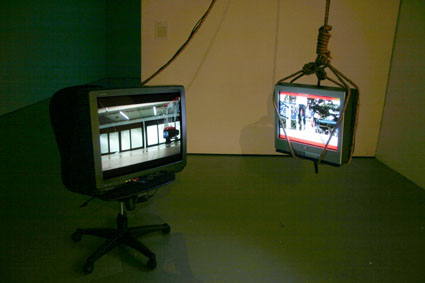The pause that refreshes
Virginia Baxter
 Wit Pimkanchanapong, Family Portrait (2002),
Wit Pimkanchanapong, Family Portrait (2002),
3 screens video, loop, Thailand , 2004
Developments in new media inevitably entail new thinking about exhibition spaces and the relationships that they make possible between the work and its audiences. It’s been said before but innovative responses seem painfully slow in coming. Without too much trouble, however, Earl Lu Gallery at LASALLE-SIA College of the Arts provides an accommodating space which all the works in the exhibition, -+- (negative plus negative) happily share. It helps that only Techno Temple (Kamol Phaosavasdi) has a major sound component and that Wit Pimkanchanapong’s impressive feat of suspended animation, A Family Portrait, is so subtly diverting it seduces you to enter this cool, dark room. Once you’re in, the ambience of the room and the modest scale of the 5 works on show from Thailand including UK artists based there combine to hold you happily in thrall. Two (From Here to Eternity Part II and Techno Temple occupy discrete spaces while two others (Circle of Hope and A Song for No Man) share the main gallery space with my favourite of the works, Family Portrait, 2002.
Based on clips made from a single digital snapshot of the artist’s family and using simple Photoshop manipulation, the three large format images of Wit Pamkanchanapon’s piece show us gravity at work in the everyday. There’s nothing especially virtuosic in these slightly washed-out images, just the simple evocation of an idea. An old man holds a garden hose, the animation halting the water mid-flow and sending what should be a downward movement rippling upwards through the body above. In the middle space, three large dogs hold themselves onto their haunches as a woman holds aloft a morsel of food. We suddenly observe the tension in the exchange, the dogs shivering with the weight of bodies near toppling, the tentative hand, the wariness of the woman’s gesture. In the third image, a young woman lifts a box. In the staccato movements that shake both object and body we feel simultaneous weight and effort.
Wit Pimkanchanapong is an emerging artist in Thailand’s new media art movement which is still relatively small. An influential figure in Bangkok’s underground, he has an interest in architecture, in social transformation, urban lifestyle and its landscape. In the notes on his work, he talks about the experience of his middle class family “who encountered the tug of war between old and new, conservative and open minds, calm and dynamic–a phenomenon that most of us experience in every corner of the world.”
 Jim Prevett & McArthur, A Song for No Man,
Jim Prevett & McArthur, A Song for No Man,
Video installation, Thailand / UK, 2004
Another of the complementary facets of this exhibition space is the inclusion of a table, a light and some stools. I swipe one and place it between the two monitors that comprise Jim Prevett & McArthur’s video dialogue, A Song for No Man. Between one frozen moment (a figure held mid-air on a bridge between Bangkok and Myanmar) and a period of time captured in slow motion (a parade of people laden with luggage arriving in the nowhere zone between airport terminal and destination) is a dialogue that takes time to impart its commentary on the weightless state of border crossings. I watch the work unfold then move to the table where there are books and catalogues from recent exhibitions of other South-East Asian work all of which adds context to the works on show. I take time to read under the watchful gaze of Sakarin Krue-on’s constantly circling mandala, delaying re-entry before taking on the weight of the world again.
-+-(negative plus negative), curator Gridthiya Gaweewong, Project 304, Chiangmai, Thailand; organised by Earl Lu Gallery, LASALLE-SIA College of the Arts and MAAP; MAAP in Singapore-GRAVITY, Oct 7-31
RealTime issue #64 Dec-Jan 2004 pg.






